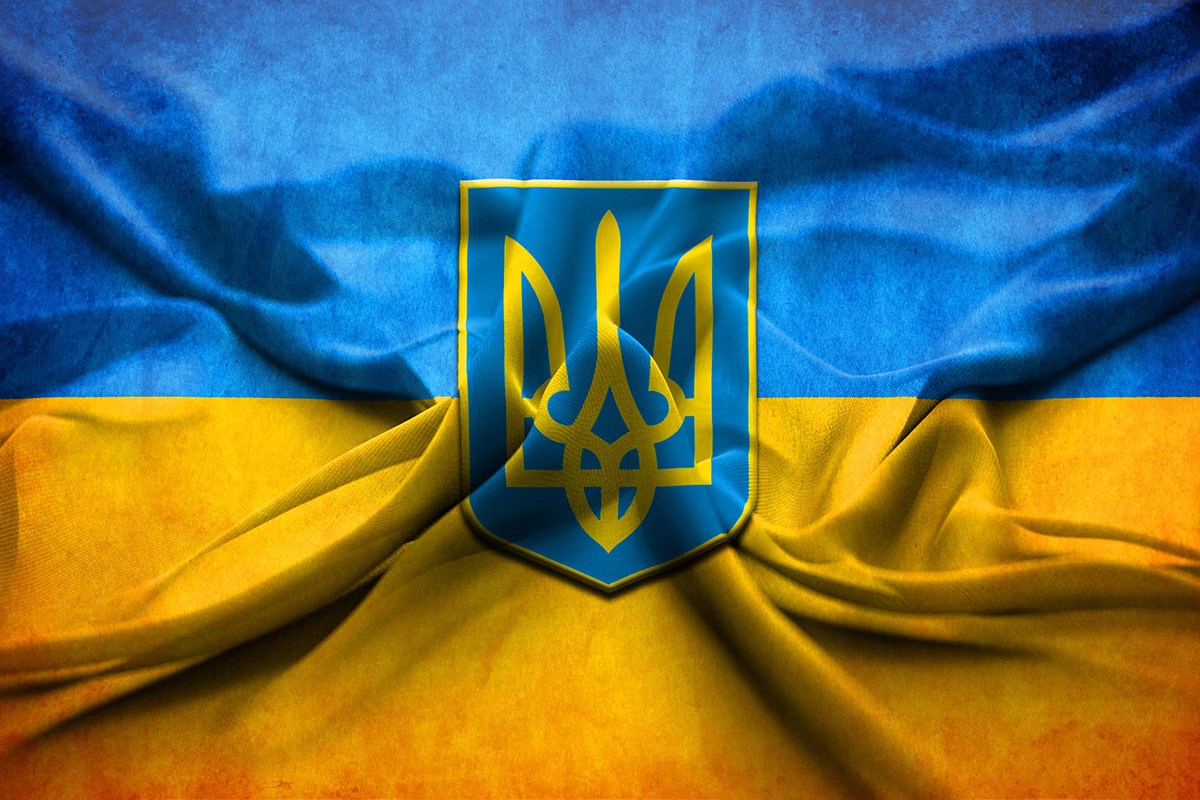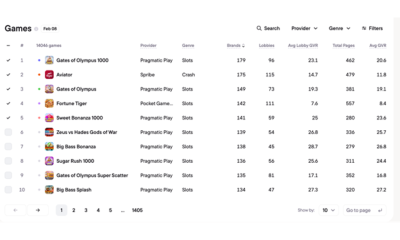Eastern Europe
Lack Of Professional Approach To Legalization Of Gambling

The necessity of legalization of gambling in Ukraine has been the topic of interest for a long time. The new government, at the initiative of President Zelensky, has been trying to do this for almost a year now. Experts gave hundreds of comments about this process, journalists wrote dozens of articles, and deputies held many meetings of various working groups. In general, the relevant bill has undergone a number of changes and for a long time has been evolving step by step to an increasingly acceptable form: the general opinion of the market is that the law should be the same for everyone, everyone is ready to certain compromises, and even a high fixed cost of licenses is considered acceptable when the tax on gross gaming revenue (GGR) is abolished. But today the improvement of the bill hit up against the interests of the lottery pool of deputies, who are trying in every possible way to maintain the monopoly position of the lotteries and the associated gray schemes of work of other types of gambling. For this reason, the bill 2258-d on second reading runs the risk of entering the session hall with a number of fundamental problems that will simply nullify the positive effect of the legalization of gambling in Ukraine.
The motivation of the deputies from the lottery circle is obvious, they simply work off the corrupt rent of their patrons. But the motives of the deputies close to President Zelensky are not clear. In case of collapse of legalization or failure to get the expected results, this initiative will turn into a pile of stones that will be thrown at the President by both the opposition and other enemies without hesitation. Especially considering the fact that the President took this issue under his personal control.
Two main factors have caused the current unfavorable situation regarding the legalization of gambling in Ukraine: 1) the subjectivity of certain influence groups (strongly represented by the lottery pool of deputies), and 2) an exclusively theoretical understanding of the mechanism of work and specific features of the gambling business, which can be observed in the statements made by the head of the relevant committee, Daniil Getmantsev. Thus, instead of a broad discussion with future gambling operators, which could contribute to the development of a realistic draft law, we get a substitute for lottery “wishlist”, and an ordinary incompetence.
It will take more than one article to describe all the mistakes of legalization of gambling “in the Ukrainian style”. But nevertheless, the most striking moments can be singled out, without the resolution of which all the previous work will go down the drain.
So, the biggest problem is that the work on the relevant law is carried out without regulating the tax aspect of the organization of gambling. This approach may result in gambling operators paying taxes of 50-60% of profits for doing business legally. In this case, legalization will remain only on paper, as well as the long-awaited income to the treasury. Therefore, it is now extremely important to start a broad discussion on the tax burden for the gambling business. Since the budget of Ukraine needs fast money, and setting up an online monitoring system to track gross gaming revenue (GGR) requires considerable amount of time and specialist training, it would be logical to keep high license fees, but abolish the GGR tax. To understand the numbers, we want to remind you that for one license for 5 years, gambling operators in Ukraine will have to pay (ed. – take into account currency rate fluctuations): a casino – from $5.8 million to $20 million, depending on the number of rooms in the hotel; bookmakers – more than $21 million; lottery distributors – $14.7 million; gambling rooms – $145 thousand; online casinos – $2.4 million. At the same time, legislators plan to establish the GGR tax in the range of 18-25%, in spite of the bill 2713-3, which abolishes the tax on gross gaming revenue (GGR).
In general, world experience provides a choice between two options – either a high license fee or a GGR tax. More precisely, with a GGR tax a license fee may be levied, but then its amount is set at a very low level. In fact, a high fixed license fee is a tax on gross revenue paid in advance. Here are some examples from world experience.
In Britain, for example, a one-time fee for applying for a gambling license is €5,730, and a staff/ management license is about £330. The head of a gambling establishment is also obliged to pay an annual fee to ensure that his current license continues to be valid. The annual license fee depends on the gross turnover of the company. Gambling in England is subject to two taxes: 15% tax on total gaming revenue, and 18% income tax.
In the Netherlands, taxation on the organization and conduct of gambling is also quite high. Casino operators must pay a 29-percent gross revenue tax on games. In addition, they must also contribute 1.5% to the development of the gambling association and 0.25% to the fund against drug addiction.
Swedish casinos are obliged to pay a tax of 18% of their total gaming revenue. For doing business in the country you also need to purchase a license. It can cost from 6 to 70 thousand euros.
In Malta, the gaming tax makes up 5% of the revenue generated from certain gaming services during the relevant tax period. The tax on gaming devices in Malta varies from 12.5% to 30% for different types of licenses. Malta gambling management requires a company applying for a gaming service license to have a minimum share capital from 40 thousand euros to 100 thousand euros, depending on the type of gambling establishment in terms of profitability.
In France, the rules for calculating tax rates are as follows: the gambling turnover tax is 8.5%, and income tax is additionally paid at the standard rate of 28%.
In addition to taxes, all casinos also pay certain fixed fees. So, the budgets of municipalities on a daily basis receive 12 euros from the first roulette that opens and 6 euros from each subsequent roulette that opens.
Thus, the tax on GGR is usually used in those countries where there is no license fee or it is symbolic. In most countries where gambling is legalized, the authorities understand that gambling brings sufficient revenues to the budget, but it requires an adequate tax base.
To introduce the GGR tax, an optimal monitoring system is needed. It shouldn’t be overloaded, the way our parliamentarians do this, striving to stuff everything possible and impossible into monitoring. This approach is an evidence of a superficial and purely theoretical knowledge of the authors of such ideas. For the GGR tax, the most important thing is to control the entry and exit of funds. For example, if 2 million UAH was brought during quarter, and 1.8 million UAH was given away as wins, then out of 200 thousand the GGR tax will be calculated. Everything is extremely simple. It is better to transmit information in the online monitoring system in non-personalized form and in a package, rather than in real time format and with all the data about the player, because otherwise, any halting will lead to an interruption in the operator’s work or to an unintentional violation of the law. But until such a simple and effective system is offered, it is better to use a high license rate and not charge the GGR tax.
If the gambling business is nipped in the bud, then the budget will not get any money. Therefore, the philosophy of the attitude to this type of business needs to be changed, it is necessary to create an adequate tax base and equal conditions for all operators. In response, the state will receive both substantial revenues to the budget and substantial amount of money for charity. Historically, gambling money goes to support social projects. For example, in France, theaters were built on taxes from the organizers of gambling establishments, and a famous opera house was built in Baden-Baden (Germany) on the tax revenues from the gambling industry. In the Netherlands, the representatives of the gambling industry sponsor the football championship, and in Canada – the annual stage of Formula 1 auto racing. In the USA, casinos finance basketball and hockey clubs.
In many countries, the distribution of tax revenues from the gambling business goes under special budget items. In Denmark, 65% goes directly to the Ministry of Culture and is directed to the development of sports and cultural life. In Finland, profits from lotteries and casinos are directed through the Ministry of Education to finance the development of national culture, and state revenues from betting on horse races are used to stimulate the development of national horse breeding and to conduct equestrian competitions.
For centuries, the authorities of various states have been convinced that human passions, including excitement, can’t be eradicated and prohibited, and therefore the only adequate solution is to find a reasonable compromise between the state, business and player. Many European countries have accepted such a philosophy a long time ago, and it’s time for Ukraine to finally take this path by creating a competitive market that will: a) be attractive to foreign investors; b) create hundreds of thousands of well-paid jobs, and c) replenish the budget with tax payments.
Powered by WPeMatico
Alina Mihaela Popa Chief Commercial Officer at ICONIC21
ICONIC21 Expands into Romania, Securing Launch Agreements with Fortuna and Casa Pariurilor
The provider increased its presence in Romania by launching with two of the market’s leading operators, Casa Pariurilor and Fortuna.
Popular iGaming content provider ICONIC21 launches with Casa Pariurilor and Fortuna. The integrations represent a further strategic move in the provider’s swift expansion within regulated markets.
Casa Pariurilor and Fortuna rank among the most well-known brands in Romania, possessing a robust retail and online presence, relied upon by a large player community. Collaborating with both operators strengthens ICONIC21’s dedication to providing top-notch, tailored content for prominent brands in competitive markets.
A broad range of ICONIC21’s live casino games is now accessible to its players, featuring prominent titles from the Gravity Series like Gravity Roulette and Gravity Blackjack. The Gravity Series incorporates multiplier mechanics into traditional casino formats, enhancing engagement while maintaining a sense of familiarity. The collection additionally features various roulette versions and well-liked Asian games like Sic Bo and Baccarat, guaranteeing wide player attraction.
The growth emphasizes ICONIC21’s rapidly advancing roadmap, covering live casino, slots, virtual and instant games, dedicated studios, and proprietary promotional tools. Every vertical is created to enable flexible integration, customized environments, and expandable growth for operators.
Alina Mihaela Popa, Chief Commercial Officer at ICONIC21, commented: “Romania is a key regulated market for us, and going live with Casa Pariurilor and Fortuna confirms the strong demand for our portfolio. We are growing quickly across regulated jurisdictions, and Romania is a clear example of how our products resonate with established operators who prioritise quality, performance, and flexibility.”
Michael Foster, Group Head of Commercial Gaming Operations, added: “Integrating ICONIC21’s portfolio allows us to enhance our live casino offering with strong, performance driven titles. The Gravity Series in particular brings an extra engagement layer to classic games, which aligns well with our strategy of delivering differentiated experiences to our players.”
The post ICONIC21 Expands into Romania, Securing Launch Agreements with Fortuna and Casa Pariurilor appeared first on Eastern European Gaming | Global iGaming & Tech Intelligence Hub.
Alina Mihaela Popa Chief Commercial Officer at ICONIC21
ICONIC21 Boosts Romania Operations Through VivaBet Alliance
ICONIC21 advances its strategic growth in regulated markets through a new collaboration with VivaBet, a rapidly expanding online casino operator in Romania.
By means of this agreement, sought-after supplier ICONIC21 provides a collection of more than 15 live casino games, enhancing VivaBet’s selection with content focused on performance.
VivaBet established a solid presence in the Romanian market by emphasizing a varied casino selection and a user-friendly platform designed for local users. Functioning within Romanian regulations, the brand persists in investing to broaden its content library to stay pertinent in a fiercely competitive landscape.
The inclusion of ICONIC21’s live casino collection helps achieve this goal by presenting contemporary studios, rapid gameplay, and multiplier-driven features that enhance player involvement.
Among the games going live with VivaBet are some of ICONIC21’s strongest performers:
· Gravity Blackjack
· Gravity Roulette
· Multiple variations of Baccarat
The Gravity Series, recognized for its multiplier mechanics integrated into classic formats, introduces an additional dimension to conventional table games. This strategy has reliably produced high engagement metrics in various markets.
Merging traditional casino elements with improved payout opportunities and refined studio aesthetics, the collection meets the desires of Romanian players who are progressively pursuing both recognition and extra thrill.
Commenting on the partnership, Alina Mihaela Popa, Chief Commercial Officer at ICONIC21, said: “Romania is a key regulated market for us, and partnering with VivaBet marks another important step in strengthening our footprint locally. We see strong demand for live content that blends classic gameplay with modern mechanics, particularly within our Gravity Series. Collaborating with an operator that understands its audience and is focused on continuous growth allows us to deliver real value.”
From VivaBet’s side, Matei Secaci, Head of Casino, added: “We are pleased to integrate ICONIC21’s live portfolio into our platform. Expanding our array of games with a provider that is growing quickly and investing in high quality production enables us to further enhance the experience we offer our players. The addition of titles such as Gravity Blackjack and Gravity Roulette brings fresh energy to our live casino section.”
The partnership with VivaBet is a key element of ICONIC21’s wider growth plan in regulated European markets. Through providing adaptable integration, a varied live portfolio, and studio-led innovation, the company remains a dependable partner for operators in search of unique live casino content.
With the increasing demand for interactive, enhanced live games, collaborations like this one strengthen ICONIC21’s dedication to providing scalable, performance-oriented solutions customized to the requirements of each market.
The post ICONIC21 Boosts Romania Operations Through VivaBet Alliance appeared first on Eastern European Gaming | Global iGaming & Tech Intelligence Hub.
CEO of GGBET UA Serhii Mishchenko
GGBET UA kicks off the “Keep it GG” promotional campaign

A leading gaming brand in Ukraine has launched a collection of ads featuring the tagline “Keep it GG” as part of an extensive communications initiative. The videos are currently being broadcast on Ukrainian TV, online platforms, and the brand’s social media accounts.
“GG” (Good Game) started in video game culture, yet its significance has far surpassed the literal meaning of “well played.” Currently, it symbolizes a worldwide sign of honor and gratitude for the feelings exchanged following a match, no matter the outcome. This concept served as the basis for GGBET UA’s latest marketing campaign. The video series embodies a unique GG atmosphere: rather than using a conventional voiceover, it incorporates complete audio tracks; the narrative features both literal and metaphorical allusions to sports and esports terms, alongside in-game and casino aspects; and prominent Ukrainian footballers are among the main characters.
“Every game, every match, every tournament is a moment that brings people together. For us, it’s important that every interaction with GGBET gives users that good game feeling — an experience that outlives the result and leaves vivid emotions behind, just like after watching a match,” comments CEO of GGBET UA, Serhii Mishchenko.
Going beyond the traditional view of GG also signifies a more profound implication — the brand’s strategic focus. The international brand, which has concentrated on esports for several years and attained significant success in esports betting and collaborations, is now adopting best practices to enhance traditional sports in regional markets. GGBET UA showcases a wider strategy for Good Game via collaborations (FC Dynamo Kyiv, FC Polissya, and the Ukrainian Basketball Federation), by organizing its own events and special projects, including initiatives that blend sports with esports, like the Match of LeGGends: Derby showmatch on the server featuring esports athletes and football players.
The brand’s creative team collaborated with a Ukrainian advertising agency and a Ukrainian production company to develop the commercials. GGBET UA made this choice to assist the local creative sector amid the war.
The post GGBET UA kicks off the “Keep it GG” promotional campaign appeared first on Eastern European Gaming | Global iGaming & Tech Intelligence Hub.
-

 Latest News7 days ago
Latest News7 days agoGGBET UA hosts Media Game – an open FC Dynamo Kyiv training session with journalists from sports publications
-

 Latest News7 days ago
Latest News7 days agoSlots dominate Brazil’s casino catalog, but crash games capture outsized player demand,Blask data reveals
-

 Latest News7 days ago
Latest News7 days agoBagelmania Backroom Comedy night lineup announced for Thursday, Feb. 26
-

 Baltics4 days ago
Baltics4 days agoHIPTHER Baltics Launches in Vilnius with Agenda Revealing Lithuania’s 2026 Regulatory Reset
-

 Amusnet4 days ago
Amusnet4 days agoAmusnet Enters into Strategic Partnership with Twinsbet Arena in Vilnius, Lithuania
-

 Brazil4 days ago
Brazil4 days agoOctoplay Enters Brazilian Market Through a Strategic Partnership with Superbet
-

 iGaming7 days ago
iGaming7 days agoN1 Insights: The iGaming Trends Everyone Will Be Talking About This March
-

 Andrew Cardno4 days ago
Andrew Cardno4 days agoQCI Launches its Data Community Platform in Australia



















